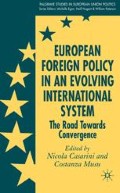Abstract
The objective of this chapter is not to offer an historical reconstruction of the role of the EU in the Arab-Israeli peace process, but rather to use the Arab-Israeli peace process as an instrument to conceptualize European Union foreign policy. European policy towards the Middle East in fact, and in particular towards the Arab-Israeli conflict and peace process, constitutes an ideal case study for the problem of political integration in the EU (Soetendorp 2002). The Middle East has been one of the most widely debated issues among member states in the past 35 years and was one of the items discussed at the first EPC meeting in 1970. European countries are directly and indirectly involved in the Arab-Israeli conflict because of their geographical proximity to the region, their dependence on Middle Eastern oil, their fears of an insecurity spillover, but also because of the special relationship that many member states have with the region as a consequence of their past as colonial powers (Greilsammer and Weiler 1987) and because of historical memories from the complex patterns of persecution of European Jews, and of occupation and collaboration during the Second World War. The study of European Middle East policy offers the opportunity to test the ability of member states to harmonize their distinct foreign policies, to identify common interests and to proceed along the road of further integration and towards the elaboration of a common European foreign policy.
An earlier version of this chapter was published as an article in the European Foreign Affairs Review (Musu 2003).
Access this chapter
Tax calculation will be finalised at checkout
Purchases are for personal use only
Preview
Unable to display preview. Download preview PDF.
Notes
In a speech to the Italian Parliament in July 1960, Christian Democrat Aldo Moro spoke of what he called ‘parallel convergences’, referring to the parallel abstention of a left and a right party (i.e. the Socialist Party and the Monarchic Party), which had allowed the formation of a new centrist government in Italy under the leadership of Mr Fanfani. Italian Parliamentary Acts, Stenographical Reports, 20–26 July, 1960.
See Alasdair Sandford, ‘France uneasy about mandate’, BBC News, Paris, 16 August, 2006, available at http://news.bbc.co.Uk/go/pr/fr/-/l/hi/world/middle_east/4800185.stm
Editor information
Editors and Affiliations
Copyright information
© 2007 Nicola Casarini and Costanza Musu
About this chapter
Cite this chapter
Musu, C. (2007). The EU and the Arab-Israeli Peace Process. In: Casarini, N., Musu, C. (eds) European Foreign Policy in an Evolving International System. Palgrave Studies in European Union Politics. Palgrave Macmillan, London. https://doi.org/10.1057/9780230593145_8
Download citation
DOI: https://doi.org/10.1057/9780230593145_8
Publisher Name: Palgrave Macmillan, London
Print ISBN: 978-1-349-54509-4
Online ISBN: 978-0-230-59314-5
eBook Packages: Palgrave Political & Intern. Studies CollectionPolitical Science and International Studies (R0)

